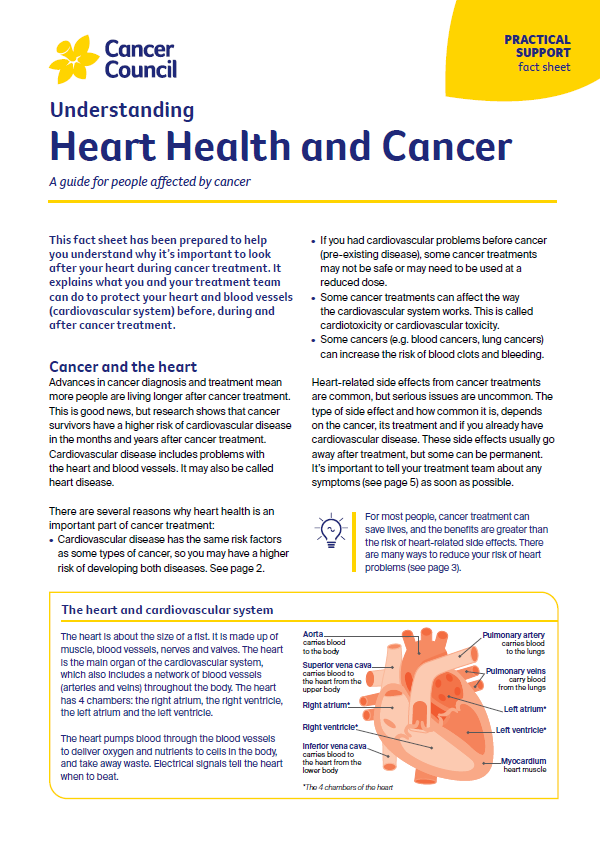- Home
- About Cancer
- Managing side effects
- Heart health and cancer
- Prevention and monitoring
Prevention and monitoring
Learn why it’s important to check and protect your heart health before starting cancer treatment.
Learn more about prevention and monitoring:
Before treatment
Your heart health may be checked before you start cancer treatment. It’s important that your treatment team knows about any existing heart problems or risk factors (e.g. high blood pressure, high cholesterol, diabetes) so they can recommend the safest and most effective cancer treatment for you.
The doctor may ask you about your risk factors for developing heart problems and any previous heart issues or cancers you’ve had. They may also suggest changes you can make to improve your heart health.
To work out your overall risk of heart problems, your doctors will consider:
- your heart health before treatment
- any risk factors you have
- if the cancer treatments could affect your heart.
If you don’t have heart concerns and your treatment plan does not include treatments that might affect your heart, you may not need to have any heart tests.
If you have risk factors for cardiovascular disease or are receiving cancer treatment that may affect your cardiovascular system, then you may need some tests. You may have these before cancer treatment starts (called baseline tests). Any further tests can then be compared with the results of baseline tests to check for any changes in your heart during and after treatment.
During and after cancer treatment
After having some of these tests, your risk of developing heart problems will be assessed as low, moderate, or high and very high. This helps your doctors work out a treatment plan, and how closely to monitor your heart during and after your treatment.
Your heart risk may change over time. It’s important to tell your GP or cancer treatment team if you notice any symptoms that could be related to your heart. When found early, heart problems can usually be managed and are less likely to become serious.
→ READ MORE: Managing heart problems
Prof Bogda Koczwara, Director, Australian Research Centre for Cancer Survivorship, UNSW, NSW; Prof Aaron Sverdlov, Cardiologist and Co-Director, Newcastle Centre of Excellence in Cardio-Oncology, Hunter New England Health and The University of Newcastle, NSW; Dr Diana Adams, Medical Oncologist, Macarthur Cancer Therapy Centre, NSW; Tamara Casey, Clinical Nurse Consultant, Breast Assessment Unit, Fiona Stanley Hospital, WA; Dr Daniel Chen, Cardiologist and Specialist in Cardio-Oncology, Prince of Wales and St George Hospitals, NSW; A/Prof Eng-Siew Koh, Radiation Oncologist, Liverpool Cancer Therapy Centre, Liverpool Hospital and University of NSW, NSW; Cynthia Leigh, Consumer; Dr David Mizrahi, Senior Research Fellow and Accredited Exercise Physiologist, The Daffodil Centre at Cancer Council NSW and The University of Sydney, NSW; Prof Doan Ngo, Co-Director, Newcastle Centre of Excellence in Cardio-Oncology, The University of Newcastle, Hunter Medical Research Institute, NSW; Peter O’Hearn, Consumer; Prof Nick Pavlakis, Medical Oncologist, Royal North Shore Hospital and Professor of Medicine, The University of Sydney, NSW; Deb Roffe, 13 11 20 Consultant, Cancer Council SA; Dr Lorcan Ruane, Cardiologist, The Prince Charles Hospital, QLD; Margaret Ryan, Nurse Practitioner, Cardio-Oncology Clinic, Prince of Wales Hospital, NSW; Dr Elysia Thornton-Benko, Specialist GP/Primary Care and Cancer Survivorship Physician, NSW; Helen Wardman, Consumer; Dr Trent Williams, Clinical Nurse Consultant, Cardiology, John Hunter Hospital, NSW; Dr Janice Yeh, Radiation Oncologist, Peter MacCallum Cancer Centre, VIC; Megan Yong, Consumer.
View the Cancer Council NSW editorial policy.
View all publications or call 13 11 20 for free printed copies.
